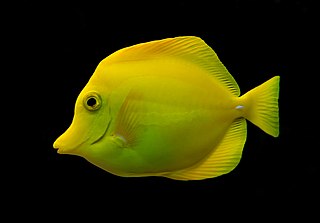
The yellow tang, also known as the lemon sailfin, yellow sailfin tang or somber surgeonfish, is a species of marine ray-finned fish belonging to the family Acanthuridae which includes the surgeonfishes, unicornfishes and tangs. Bright yellow in color, it is one of the most popular marine aquarium fish, though in its natural state, it lives in reefs. The yellow tang spawns around a full moon, eats algae, and has a white barb, located just before the tail fin, to protect itself.

Chard or Swiss chard is a green leafy vegetable. In the cultivars of the Flavescens Group, the leaf stalks are large and often prepared separately from the leaf blade; the Cicla Group is the leafy spinach beet. The leaf blade can be green or reddish; the leaf stalks are usually white, yellow or red.
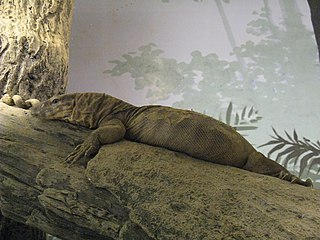
The yellow monitor or golden monitor is a monitor lizard native to South Asia.

The Angolan slender mongoose is a mongoose native to southwestern Africa, specifically southwestern Angola and northwestern Namibia. It has been listed as Least Concern on the IUCN Red List, as it is not threatened and thought to be common. It has a long, slim body and there are different colour forms, a black or dark brown form in the southern part of its range, and a yellowish- or reddish-brown form in the north. This mongoose inhabits dry, rocky habitats and feeds on insects, scorpions and small vertebrates.

Oligoryzomys flavescens, also known as the flavescent colilargo or yellow pygmy rice rat is a species of rodent in the genus Oligoryzomys of family Cricetidae. It is found in southern South America, occurring in southern Brazil, Paraguay, Uruguay, and northeastern Argentina. Its karyotype has 2n = 64-66 and FNa = 66–70.
Mycobacterium flavescens is a species of the phylum Actinomycetota, belonging to the genus Mycobacterium.

The yellow mud turtle, also commonly known as the yellow-necked mud turtle, is a species of mud turtle in the family Kinosternidae. The species is endemic to the Central United States and Mexico.
The yellow serotine is a species of vesper bat. It is found in Angola, Burundi, Cameroon, Malawi, and Mozambique. Its natural habitats are subtropical or tropical forests and savanna.

The greater red musk shrew is a species of mammal in the family Soricidae. It is found in Lesotho, Mozambique, South Africa, and Eswatini. Its natural habitats are moist savanna, temperate grassland, and rural gardens. Like most shrew species, C. flavenscens is nocturnal. The greater red musk shrew is considered to be asocial and territorial, with males using scent marking to establish their territory. Males appear to be more aggressive than females, and their aggression increases with greater population density.
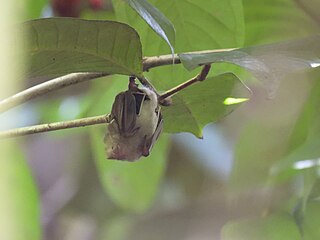
The Jamaican fig-eating bat is a species of bat in the family Phyllostomidae. It is the only living species in the genus Ariteus. The scientific name translates as "yellowish and warlike". There are no recognised subspecies.

Trisetum flavescens, the yellow oatgrass or golden oat grass, is a species of grass in the family Poaceae. It is native to Europe, Asia, and North Africa.
T. flavescens may refer to:
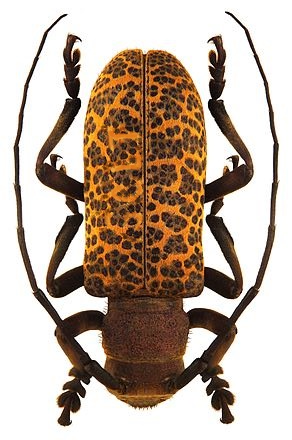
Estola is a genus of longhorn beetles of the subfamily Lamiinae, containing the following species:
Estola benjamini is a species of beetle in the family Cerambycidae. It was described by Stephan von Breuning in 1940. It is known from Colombia.
Estola brunnescens is a species of beetle in the family Cerambycidae. It was described by Stephan von Breuning in 1940. It is known from Colombia and Venezuela.
Estola nigropunctata is a species of beetle in the family Cerambycidae. It was described by Stephan von Breuning in 1940. It is known from Brazil.
Estola freyi is a species of beetle in the family Cerambycidae. It was described by Stephan von Breuning in 1955. It is known from Trinidad.
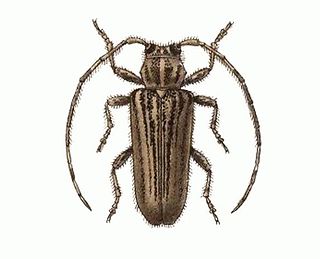
Estola vittulata is a species of beetle in the family Cerambycidae. It was described by Henry Walter Bates in 1874. It is known from Panama, Mexico and Venezuela.
Estola insularis is a species of beetle in the family Cerambycidae. It was described by Blair in 1933.
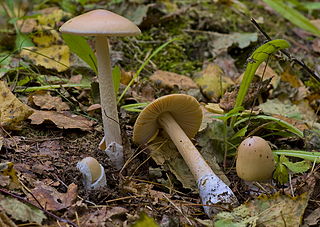
Amanita flavescens is a species of Amanita found in Sweden and Norway.










